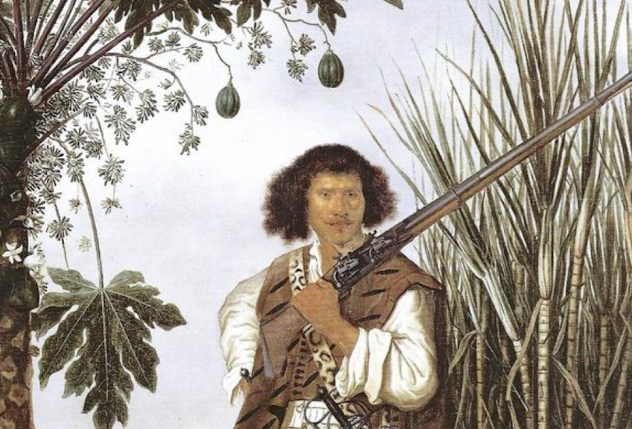Between 1630 and 1654 the Dutch seized much of Brazil from the Portuguese, and ruled it as their own colony. At the start of this period, Portugal was in an imposed dynastic "union" with Spain, but from 1640 onwards, it started to reassert its independence.
One of the factors in the initial Dutch success was the assistance they received from Portuguese Jews, many of whom had been forcibly converted to Christianity and saw the more tolerant Dutch as a better option.
In Judeus no Brasil: Estudos e Notas (Jews in Brazil: Studies and Notes) contemporary Portuguese historian Thana Mara de Souza writes about the role played by the converted Jews (conversos) who were required to wear badges (crests):
In Judeus no Brasil: Estudos e Notas (Jews in Brazil: Studies and Notes) contemporary Portuguese historian Thana Mara de Souza writes about the role played by the converted Jews (conversos) who were required to wear badges (crests):
"The facts about the Dutch conquest are known and historians are unanimous in stating how anxious the new Portuguese crests were for the establishment of the Dutch to be successful, for in that way they could return to their truth faith, Judaism. The chief spy of the Dutch in Brazil was the Lord of ingenuity João Brabantino, a new crest who resided in Pernambuco since 1618 or 1620, and who provided valuable information to the invaders who occupied the town of Olinda in February 1630."
De Souza also cites Duarte de Albuquerque Coelho (1591 - 1658), the first and only Viscount of Pernambuco and Marquis de Basto (Olinda), who wrote historical works, such as Memórias Diárias de la Guerra del Brasil (Daily Memories of the War of Brazil), published in Madrid in 1654, narrating the struggle against the Dutch in Pernambuco from 1630-1638.
"According to the chronicler Duarte de Albuquerque Coelho, the Jew Antonio Dias Paparrobalos, served as a central guide for the troops the Dutch landed. The military expedition organized in 1629, composed of mercenaries of various nationalities, including a unit mostly composed of Portuguese Jews, called at the time the 'Company of Jews.' Its existence is confirmed by the historian Hermann Kellenbenz who discovered in the documents of the Spanish inquisition in Madrid, a list of 41 names of Sephardic Jews and 20 Ashkenazes from Germany who enlisted as soldiers of the fleet of Admiral Hendrick Lonck who took Pernambuco in 1630. The list was reported by the Portuguese Captain Estevan of Ares de Fonseca, a 'new crest' who converted [back] to Judaism in Amsterdam. Captured by the Spaniards in the wars against the Protestants in the Netherlands, Fonseca confessed to the inquisitors the active participation of Portuguese Jews in the army of the Dutch Republic and the invasion of Brazil."
While important at the foundation of Dutch Brazil, Jews were also there at the end:
"Among the Jewish soldiers who stood out most in Brazil Dutch was Captain Moses Navarro, who came to Pernambuco as a naval soldier, and in 1635 became an important sugar and tobacco merchant, becoming one of the richest men in Dutch Brazil. It was Moses who served as an interpreter for Sigismund von Schkopp with the Portuguese after their defeat at the Battle of the Guararapes in 1649, and convinced the commander Francisco Barreto de Menezes to allow the Dutch to bury their dead. After the end of Dutch Brazil in 1654 Navarro and his brothers Aaron and Jacob moved to Barbados Island."
The strong religious motivation of the Portuguese Jews was demonstrated in how some of them reacted to the reestablishment of Portuguese authority:
"According to Johan Nieuhof's accounts, many Jews of Recife preferred to die in combat against the Pernambuco insurrection than to be forced to convert to Catholicism again."
Others, however, were content to re-convert:
"In 1655 Frei Manoel Calado reported that two Jewish soldiers captured in Recife, Jacques Franco, and Isaac Navarro were renamed in the Catholic faith and ended up staying in Brazil even after the end of the Dutch presence."
























No comments:
Post a Comment